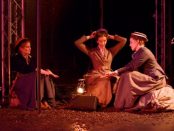Emma and Max
Solondz’s mordant wit makes this the darkness of tragicomedies. Brooke and Jay’s delusions so typical of white entitlement are entire their own. When we finally hear from Brittany, she turns out to be a keen observer of entitled white behavior and middle-class liberal hypocrisy. Though we never meet Emma and Max except on Brooke’s baby cam, their off-stage presence is felt throughout the play. As Solondz’s movies contain brilliantly written dialogue, he is a natural for the theater. While his movies are made up of mostly two character scenes, this technique transfers beautifully to the stage. The only flaw here is that the monologues which become rants go on a bit too long, long after we get the gist and the characters given their many prejudices away. A bit of skillful trim – or the invention of more ideas would make this an even more powerful play. [more]




